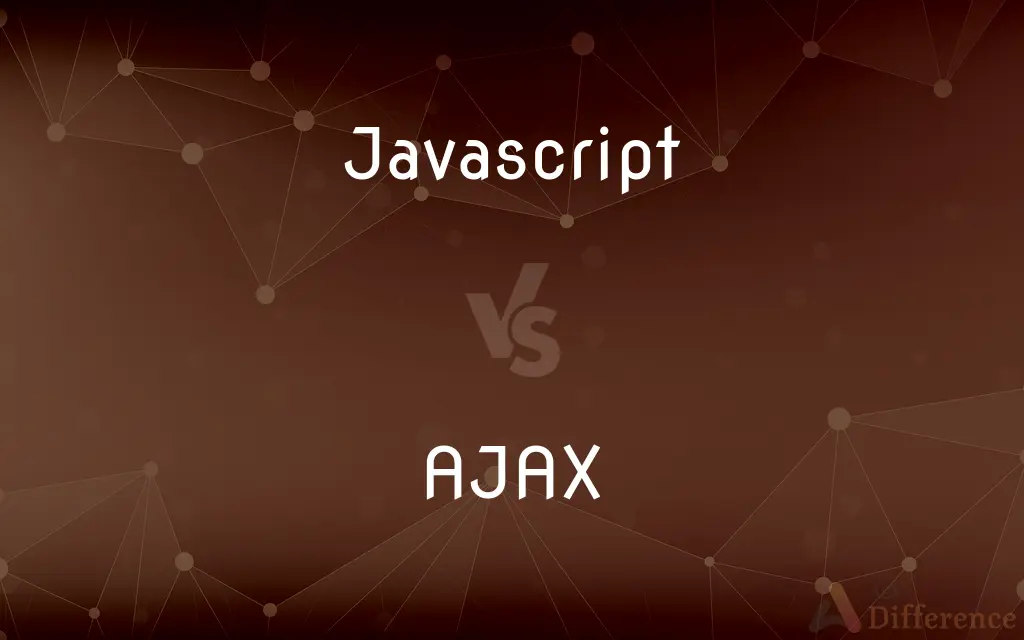Javascript vs. AJAX — What's the Difference?
By Tayyaba Rehman — Published on January 18, 2024
Javascript is a programming language used to make web pages interactive. AJAX, which stands for Asynchronous JavaScript and XML, is a technique using Javascript to fetch data from a server without reloading the page.

Difference Between Javascript and AJAX
Table of Contents
ADVERTISEMENT
Key Differences
Javascript is a versatile scripting language primarily used to add interactivity and dynamic behavior to websites. From altering content on a page to creating animations, Javascript powers many of the interactive features users have come to expect from modern websites. Without Javascript, web pages would remain largely static, only changing content when a new page is loaded.
AJAX, on the other hand, is not a language but a technique that employs Javascript. The name AJAX stands for Asynchronous JavaScript and XML, emphasizing its main components. AJAX allows web pages to retrieve and send data to a server asynchronously, meaning without having to reload the entire page. This capability revolutionized web applications, enabling features like real-time search suggestions and auto-saving form data.
While Javascript serves as the foundation of many web interactions, AJAX specifically focuses on improving user experience by minimizing page reloads. A classic example is social media feeds that automatically load new content as users scroll. This behavior is facilitated by AJAX, but it's Javascript that executes the underlying commands and processes.
In essence, Javascript is the broader tool, a language with which developers can create a multitude of web functionalities. AJAX, however, is a specialized technique within the Javascript ecosystem, particularly tailored for enhancing web page data interactions without continual reloads.
The distinction is clear: while all AJAX implementations use Javascript, not all Javascript is used for AJAX. AJAX represents just one of the many capabilities Javascript offers to web developers.
ADVERTISEMENT
Comparison Chart
Nature
Programming Language
Technique using Javascript
Primary Use
Adding interactivity to websites
Fetching data without reloading a webpage
Dependency
Standalone
Depends on Javascript
Interaction with Server
Can interact but not always asynchronously
Asynchronously interacts with server
Scope
Broad, covers many aspects of web interactivity
Specific, focused on asynchronous data interactions
Compare with Definitions
Javascript
Javascript is an essential component of the modern web, powering client-side interactivity.
Features like slideshows or form validations on websites typically use Javascript.
AJAX
AJAX is a technique for fetching data from a server without reloading a webpage.
When typing in a search bar and seeing suggestions, AJAX is often working behind the scenes.
Javascript
Javascript runs directly in web browsers, enabling real-time webpage modifications.
A user clicking a button and seeing a pop-up is often powered by Javascript.
AJAX
AJAX enhances user experience by providing real-time data interactions.
On social media, new posts can appear automatically thanks to AJAX.
Javascript
Javascript is event-driven, reacting to user actions like clicks or key presses.
When a user hovers over an image, Javascript can enlarge it for a better view.
AJAX
AJAX combines Javascript, the XMLHttpRequest object, and server-side scripts.
In a chat application, AJAX ensures messages are sent and received without page reloads.
Javascript
Javascript is a scripting language used to create dynamic web content.
With Javascript, developers can animate a dropdown menu on a website.
AJAX
AJAX can work with data formats other than XML, such as JSON.
A weather widget updating temperatures uses AJAX to fetch JSON data.
Javascript
Javascript interacts with HTML and CSS to bring websites to life.
Javascript can dynamically change the style of a web element upon user interaction.
AJAX
AJAX stands for Asynchronous JavaScript and XML.
AJAX allows web applications like email clients to update without page refreshes.
Common Curiosities
What is Javascript?
Javascript is a programming language used to add interactivity to websites.
How is AJAX related to Javascript?
AJAX is a technique that uses Javascript to fetch and send data asynchronously without reloading the page.
Is Javascript only used for web development?
While predominantly for web, Javascript is also used in areas like server-side development with Node.js.
Is AJAX a programming language like Javascript?
No, AJAX is a technique, not a language, while Javascript is a programming language.
What does asynchronous mean in AJAX?
Asynchronous means the browser doesn't wait for data fetches to complete and continues processing other tasks.
Can I use AJAX without Javascript?
No, AJAX relies on Javascript to function.
Why is AJAX important?
AJAX improves user experience by allowing web applications to update content without full page refreshes.
Does AJAX only work with XML data?
No, despite "XML" in its name, AJAX can work with other data formats, like JSON.
Is Javascript the same as Java?
No, despite similar names, Javascript and Java are distinct languages with different use cases.
Can I create interactive web pages using only Javascript without AJAX?
Yes, Javascript can create interactive web features, but for asynchronous data interactions, AJAX is beneficial.
How does Javascript interact with HTML?
Javascript can access, modify, and manipulate HTML elements and attributes to change web content dynamically.
Can AJAX fetch data from external websites?
Typically, AJAX is subject to the same-origin policy, but techniques like JSONP or CORS can bypass this.
Why is Javascript considered an essential web technology?
Javascript brings websites to life by adding interactive and dynamic behavior, enhancing user experience.
How do AJAX calls improve web application speed?
AJAX allows partial data fetching, so only relevant portions of a page are updated, avoiding full page reloads.
Can I learn AJAX without knowing Javascript?
Understanding Javascript is crucial before diving into AJAX, as AJAX implementations use Javascript.
Share Your Discovery

Previous Comparison
2D Shapes vs. 3D Shapes
Next Comparison
Giorgio Armani vs. Emporio ArmaniAuthor Spotlight
Written by
Tayyaba RehmanTayyaba Rehman is a distinguished writer, currently serving as a primary contributor to askdifference.com. As a researcher in semantics and etymology, Tayyaba's passion for the complexity of languages and their distinctions has found a perfect home on the platform. Tayyaba delves into the intricacies of language, distinguishing between commonly confused words and phrases, thereby providing clarity for readers worldwide.
















































